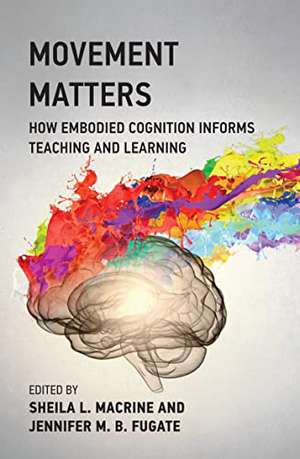Movement Matters
Editat de Sheila L. Macrine, Jennifer M. B. Fugateen Limba Engleză Paperback – 19 apr 2022
Preț: 543.92 lei
Nou
104.08€ • 108.96$ • 86.12£
Carte tipărită la comandă
Livrare economică 07-21 aprilie
Specificații
ISBN-10: 0262543486
Pagini: 352
Ilustrații: 50 black and white photos
Dimensiuni: 152 x 229 x 21 mm
Greutate: 0.52 kg
Editura: Mit Press
Descriere
Experts translate the latest findings on embodied cognition from neuroscience, psychology, and cognitive science to inform teaching and learning pedagogy.
Embodied cognition represents a radical shift in conceptualizing cognitive processes, in which cognition develops through mind-body environmental interaction. If this supposition is correct, then the conventional style of instruction—in which students sit at desks, passively receiving information—needs rethinking. Movement Matters considers the educational implications of an embodied account of cognition, describing the latest research applications from neuroscience, psychology, and cognitive science and demonstrating their relevance for teaching and learning pedagogy. The contributors cover a range of content areas, explaining how the principles of embodied cognition can be applied in classroom settings.
After a discussion of the philosophical and theoretical underpinnings of embodied cognition, contributors describe its applications in language, including the areas of handwriting, vocabulary, language development, and reading comprehension; STEM areas, emphasizing finger counting and the importance of hand and body gestures in understanding physical forces; and digital learning technologies, including games and augmented reality. Finally, they explore embodied learning in the social-emotional realm, including how emotional granularity, empathy, and mindfulness benefit classroom learning.
Movement Matters introduces a new model, translational learning sciences research, for interpreting and disseminating the latest empirical findings in the burgeoning field of embodied cognition. The book provides an up-to-date, inclusive, and essential resource for those involved in educational planning, design, and pedagogical approaches.
Contributors
Dor Abrahamson, Martha W. Alibali, Petra A. Arndt, Lisa Aziz-Zadeh, Jo Boaler, Christiana Butera, Rachel S. Y. Chen,Charles P. Davis, Andrea Marquardt Donovan, Inge-Marie Eigsti, Virginia J. Flood, Jennifer M. B. Fugate, Arthur M. Glenberg, Ligia E. Gómez, Daniel D. Hutto, Karin H. James, Mina C. Johnson-Glenberg, Michael P. Kaschak, Markus Kiefer, Christina Krause, Sheila L. Macrine, Anne Mangen, Carmen Mayer, Amanda L. McGraw, Colleen Megowan-Romanowicz, Mitchell J. Nathan, Antti Pirhonen, Kelsey E. Schenck, Lawrence Shapiro, Anna Shvarts, Yue-Ting Siu,Sofia Tancredi, Chrystian Vieyra, Rebecca Vieyra, Candace Walkington, Christine Wilson-Mendenhall, Eiling Yee
Cuprins
Foreword xiii
Introduction 1
I PHILOSOPHICAL AND THEORETICAL BACKGROUND
1 Embodied Cognition and Its Educational Significance 13
2 Embodied Concepts: Basic Mechanisms and Their Implications for Learning and Memory 25
3 Embodied, Enactive Education: Conservative versus Radical Approaches 39
II LANGUAGE
4 The Embodiment of Letter Perception: The Importance of Handwriting in Early Childhood 55
5 Embodied Classroom Activities for Vocabulary Acquisition 77
6 Educational Applications of Enacted, Embodied Approaches to Language Comprehension 91
7 Reading, Writing, Technology, and Embodiment 103
III STEM
8 Seeing Is Achieving: The Importance of Fingers, Touch, and Visual Thinking to Mathematics Learners 121
9 Groups That Move Together, Prove Together: Collaborative Gestures and Gesture Attitudes among Teachers Performing Embodied Geometry 131
10 Manipulatives and Mathematics Learning: The Roles of Perceptual and Interactive Features 147
11 Physics and Gesture: Spatial Thinking and Mutual Manifestness 163
IV APPLIED TECHNOLOGY
12 Responsive Teaching for Embodied Learning with Technology 179
13 The Need for SpEED: Reimagining Accessibility through Special Education Embodied Design 197
14 Immersive Learning Experiences in Augmented Reality (AR): Visualizing and Interacting with Magnetic Fields 217
15 Evaluating Embodied Immersive STEM VR Using the Quality of Education in Virtual Reality Rubric (QUIVRR) 237
V SOCIAL COGNITION, EMOTION, MINDFULNESS
16 Mirror Neurons and Social Implications for the Classroom 261
17 Beyond the Social Domain: Autism Spectrum Traits and the Embodiment of Manipulable Object Concepts 275
18 Embodied Emotion, Emotional Granularity, and Mindfulness: Improved Learning in the Classroom 291
Conclusion 307
Resources 317
Contributors 323
Index 327
